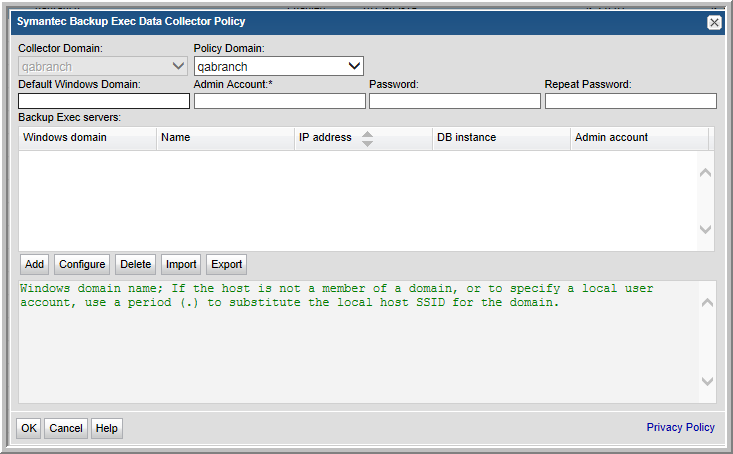Symantec Backup Exec Data Collector Policy
Prerequisites: A Data Collector must exist in the Portal, to which you will add Data Collector Policies. For specific prerequisites and supported configurations, see the APTARE StorageConsole Certified Configurations Guide.
Importing Backup Exec Server Information
For the Data Collector to interrogate the Backup Exec servers and retrieve the necessary information for transmission to the Portal, a list of the Backup Exec servers with corresponding access parameters must be loaded into the Portal database.
1. Create a comma-separated value (CSV) file, and for every Backup Exec Data Collector specified in the Data Collector Pre-Installation worksheet, enter a comma-separated line with: an optional domain name, mandatory host names and optional IP addresses, database instance, administrator user names and passwords.
If the IP Address field is left blank, the Data Collector will detect the null address and perform an IP lookup, using the host name, and then connect to the Backup Exec SQL server.
Each line in the CSV file should follow this format:
WindowsdomainName,hostname,ip_address,dbInstance,adminUserName,adminPassword
Example CSV File:
,server1,,,,
,server2,,,,
,server3,,,,
,server4,,,,
windowsdomainname,myserver,10.0.0.67,scdb,Administrator,password
In the previous example file, there are five Backup Exec servers to be loaded into the Portal. The first four servers will use the default credentials. The last server will use the credentials as specified in this file.
NOTE: Passwords are stored in the Portal database in a strongly encrypted format and only decrypted in memory once passed to the Data Collector application immediately prior to use.
WindowsDomainName, adminUserName and adminPassword - [optional] -Supply values for these three parameters if you wish to use a default Windows domain name, domain administrator user name and administrator password to connect to the Backup Exec servers. These default values will apply only to the Backup Exec servers listed in the CSV file that do not already contain values for these fields.
dbInstance- [optional] - Supply the name of a specific database instance, if you want to use a database that is different from the default Backup Exec database.
2. In the Symantec Backup Exec Data Collector Policy window, click Import to access the Upload CSV window where you can enter a default Database Instance and the name of the CSV file in which you placed the server configuration details.
Configuring a Symantec Backup Exec Data Collector Policy
1. Select Admin > Data Collection > Collectors.
The list of currently configured Portal Data Collectors is displayed.
2. Select a Data Collector from the list.
3. Click Add and select Symantec Backup Exec.
4. Enter or select the parameters.
Field | Description | Sample Value |
Collector Domain | The domain of the collector to which the collector backup policy is being added. This is a read-only field. By default, the domain for a new policy will be the same as the domain for the collector. This field is set when you add a collector. | |
Policy Domain | The Collector Domain is the domain that was supplied during the Data Collector installation process. The Policy Domain is the domain of the policy that is being configured for the Data Collector. The Policy Domain must be set to the same value as the Collector Domain. The domain identifies the top level of your host group hierarchy. All newly discovered hosts are added to the root host group associated with the Policy Domain. Typically, only one Policy Domain will be available in the drop-down list. If you are a Managed Services Provider, each of your customers will have a unique domain with its own host group hierarchy. To find your Domain name select Admin > Hosts and Domains > Domains. | yourdomain |
Default Windows Domain | Windows domain name; If the host is not a member of a domain, or to specify a local user account, use a period (.) to substitute the local host SSID for the domain. | |
Admin Account | Symantec Backup Exec Administrator account | |
Password | Symantec Backup Exec password associated with the account | |
5. Click OK to save the policy.

